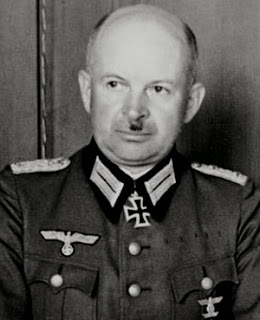 |
| Adolf Hitler |
Hitler, Adolf
Fuehrer
Commander-In-Chief of the German Army
Hitler feared a disaster at Kursk but felt a German victory
on the Eastern Front was politically necessary to fortify Italy’s wavering
resolve. Additionally, his own self-confidence
and his standing among his generals were at an all-time low following his
decisions that led to the disaster at Stalingrad. Germany’s subsequent loss at Kursk would hand
the initiative to the Red Army for the remainder of the war.
 |
| Wilhelm Keitel |
Keitel, Wilhelm
Field Marshal
Chief of the Armed Forces High Command (OKW)
 |
| Erich von Manstein |
von Manstein,
Erich
Field Marshal
Commander, Army Group South
Attacked
the southern face of the Kursk Bulge in Operation Citadel
Defended
in Operation Rumiantsev
Manstein was sure he could succeed in breaking through Russian
defenses at Kursk if only Hitler would release to him the last of Germany’s
armored reserves. Like other German
generals he would be surprised by the devastating force of the coming Red Army
counterattack.
 |
| Guenther von Kluge |
von Kluge,
Guenther
Field Marshal
Commander, Army Group Center
Attacked
the northern face of the Kursk Bulge in Operation Citadel
Defended
the Orel salient in Operation Kutuzov
By the spring of 1943 von Kluge believed his army was worn
out and badly needing to be refit. He
opposed von Manstein’s proposal to attack the Kursk Bulge in April.
 |
| Walter Model |
Model, Walter
General
Commander, Ninth German Army
Attacked
the northern face of the Kursk Bulge in Operation Citadel
Acting
Commander of Second Panzer Army and Ninth Army:
Defense of the Orel salient in
Operation Kutuzov
Model was disturbed by the extent of Soviet defenses at
Kursk and his concerns caused Hitler to further postpone Operation
Citadel.
 |
| Hermann Hoth |
Hoth, Hermann
Colonel General
Commander, Fourth Panzer Army
Made the
principal German attack on the southern face of the Kursk Bulge
Defended
in Operation Rumiantsev
Defended
in Soviet offensive toward Kharkov
Hoth’s armored forces included the lavishly equipped II SS
Panzer Corps. His decision to swing his
armored attack toward Prokhorovka on 11 July led to the largest tank battle in
history. The remnants of his nine Panzer
divisions would be met on rolling farmland by nearly 900 Soviet tanks.
 |
| Werner Kempf |
Kempf, Werner
Colonel General
Commander, Army Detachment Kempf
Attacked
the southeastern shoulder of the Kursk Bulge
Defended
in Operation Rumiantsev
 |
| Heinz Guderian |
Guderian, Heinz
Colonel General
Inspector-General of Panzer Troops
Guderian opposed any offensive in Russia during 1943
believing the Wehrmacht needed time to recover and to prepare for an Allied
invasion of Western Europe. Once the
decision was made to proceed with Operation Citadel Guderian demanded a postponement
in order to rush the latest tanks to the battlefield.
 |
| Kurt Zeitzler |
Zeitzler, Kurt
Colonel General
Chief of the Army High Command (OKH)
Zeitler was one of the few German generals confident in the
success of Operation Citadel. He felt
the new Panther and Tiger tanks would bring a decisive advantage to German
forces at the upcoming battle.
Related Topics:
Kursk Russian Leaders
Kursk
Blitzkrieg
Hitler's War Strategy
Related Topics:
Kursk Russian Leaders
Kursk
Blitzkrieg
Hitler's War Strategy


No comments:
Post a Comment